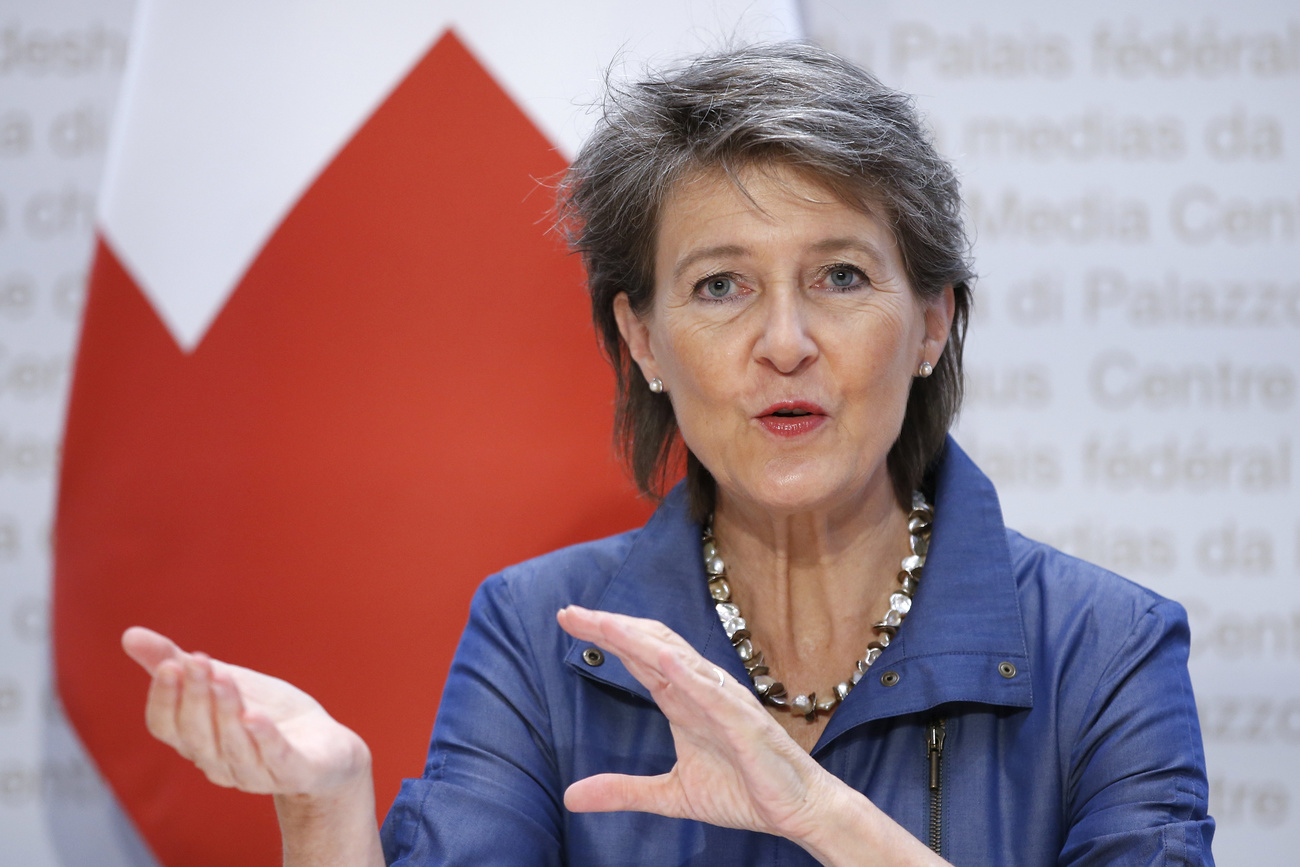Can Switzerland credibly call for ‘ambitious strategies’ at COP26?

At the United Nations climate change conference (COP26), Switzerland will push for all countries to commit to limit global warming to 1.5°C. But after voters rejected a new CO2 law, can Switzerland credibly ask others to do more?
Two weeks of talks to decide the fate of human life on Earth: the upcoming UN climate conference known as the COP26 will run from October 31 to November 12 in Glasgow, Scotland. It is seen by many as the last chance to tackle the climate crisis in accordance with the Paris Agreement. This legally binding agreement, adopted in 2015, aims to limit global warming to “well below 2 degrees Celsius” compared to pre-industrial levels and “preferably” to below 1.5 degrees.
This means global emissions would need to be cut by 45% from 2010 levels by 2030. After a pause due to the economic slowdown resulting from the coronavirus pandemic, greenhouse gases have started to rise again and are projected to increase by 16% over the decade. Even if countries maintain their current reduction pledges, the planet could be heading for a temperature increase of 2.7 degrees – a trajectory that UN Secretary-General António Guterres recently said was “catastrophic”.
“We cannot afford to waste time,” Christian Lüthi, director of Climate Alliance, a coalition of more than 100 Swiss organisations, tells SWI swissinfo. “With every year that passes without action, we risk facing a worsening climate crisis that will increasingly threaten our livelihoods.”
Switzerland’s role in avoiding double counting
At the summit all eyes will be on the world’s biggest polluters, especially China and the United States, but smaller states also want to weigh in and have their voices heard.
Switzerland is set to advocate strong and unified rules to ensure the Paris Agreement is implemented fairly around the world. “The agreement is like a constitution that needs rules for implementation,” says Franz Perrez, head of the Swiss delegation at COP26. “There are still areas where decisions are needed.”
More
One of the outstanding issues that needs international alignment is the implementation of an international carbon market listed in Article 6 of the Paris Agreement. Countries are wrangling over the utility of carbon credits and how to implement them. These allow developed countries to reduce part of their emissions by financing green projects abroad, such as a solar power plant. This practice, known as carbon offsetting, has become highly controversial. Opponents argue the focus should be on a blunt reduction of emissions and structural reform, rather than allowing developed countries to continue emitting CO2. Conflict over the issue overshadowed the previous COP meeting in Madrid in 2019.
One question no one can agree on is: Who gets to tick the emissions off their carbon footprint? The country claiming to reduce emissions through offsetting or the country hosting the project ? A lack of clear accounting standards means that in some cases the reduction of emissions gets counted twice.
Switzerland has voiced its opposition against double counting and is seeking what it calls a “good solution” to the problem. This would include setting global standards for offsetting.
COP26 will allow Switzerland to showcase the series of bilateral agreements on carbon credits it has signed with different countries. In October 2020, Switzerland and Peru were the first countries to ink an agreement on offsetting emissions. The deal was hailed as a role model for what could be an example of cooperation between public and private bodies in two countries. In the following months, Switzerland expanded that model to other partners including Ghana, Senegal, Dominica and Georgia.
“[The Peru deal] was the first time that two countries jointly established rules and standards that avoided double counting, guaranteed environmental integrity and respect for human rights, and ensured that emission reduction measures could be added up and be verifiable,” Perrez says.
Switzerland created the UN Environmental Integrity Group in 2000. The group supports progressive climate policies in international negotiations and is the only negotiating group composed of developed and emerging economies. Georgia, Liechtenstein, Monaco, Mexico and South Korea are also members.
Switzerland is also a member of the High Ambition Coalition, which was established in 2014 by the Republic of the Marshall Islands with the aim of making the Paris Agreement as ambitious as possible. The informal coalition is credited with incorporating the 1.5°C target into the agreement.
Source: Federal Office for the Environment
Setting timeframes for climate targets for each member country is another stumbling block COP participants will have to agree on.
As part of their preparations for the summit, Swiss Environment Minister Simonetta Sommaruga and her Rwandan counterpart Jeanne d’Arc Mujawamariya are working on possible solutions.
“Switzerland’s position is to present new targets every five years, instead of ten. The proposal is also supported by the European Union,” Perrez says.
Bankers and insurers weigh in
Switzerland also supports additional financing for climate protection in developing countries. Wealthy countries fell short of the $100 billion (CHF92 billion) promised in 2020 to support poorer countries mitigate and adapt to climate change. According to the Organisation for Economic Co-operation and Development (OECD), CHF18.5 billion are still missing.
However, as countries scramble to polish their climate record ahead of the summit, there are some hopeful signs. The US has promised to double its contributions to $11.4 billion a year by 2024. Switzerland is set to announce it will increase its public funding from $340 million to $425 million (to reach at total of around $640 million).
The importance of financial flows in climate protection is also reflected in the composition of this year’s Swiss delegation to Glasgow. It will include, for the first time, representatives of banks and insurance companies. “I hope they will use their power to promote sustainable finance. They must use their knowledge for the good of global populations, not for their own profits,” says Lüthi at Climate Alliance.
Some leaked documents analysed by the investigative unit of Greenpeace’s UK branch, however, suggest that Switzerland’s real intentions on climate finance may not match its official position.
Climate neutrality target applies to China too
More generally, Switzerland will insist that all countries play their part in achieving the 1.5 degree target. “We are not yet where we should be,” notes Perrez.
The head of the Swiss delegation believes that the big CO2 emitters are not doing their part. Some of them, including India, Brazil and Saudi Arabia, have not yet presented their long-term strategies on how they will comply with the Paris agreement. As for China, “it is doing a lot, but it remains the world’s biggest CO2 emitter and it is essential that it too achieves climate neutrality by 2050”, Perrez says. China has just agreed to new coal-fired power plants in a bid to mitigate its energy shortages over the winter.
But will the Swiss voice be able to tip the balance on the key issues? As a rich country, its carbon footprint per capita remains one of the highest in the world. Swiss voters’ rejection of a revised CO2 law last summer has nullified much of its green discourse. Its lack of ambition to decarbonise its economy hardly puts it in pole position to tell others what to do.
Up to 4°C warmer if everyone followed the Swiss trajectory
Climate Analytics, a non-governmental organisation that links climate science and policy analysis, criticises Switzerland’s overall climate commitments, describing them as “insufficient”. If all countries acted like Switzerland, global temperatures would rise by 3-4 degrees by the end of the century, the Berlin-based organisation said in a report published in July 2021.
Switzerland, like more than 130 other countries, is committed to having net-zero emissions by 2050. Although this is an improvement on its previous long-term target – an emission reduction of 70-85% – its short-term goal of halving emissions by 2030 has remained essentially the same. This is despite political pressure from some political parties and citizens to set more ambitious goals.
Credibility in question
The CO2 law was Switzerland’s main policy instrument for achieving its 2030 target. The question of “what next” is still hanging in the air.
“No one in Bern knows how the 2030 targets will be achieved. That’s not a good starting position to be in Glasgow,” says Patrick Hofstetter, a climate and energy expert at WWF Switzerland.
The Alpine country is not alone in this dilemma. Many European Union member states have yet to officially say how they will achieve their 2030 goals.
The head of the Swiss delegation at COP26, Franz Perrez, acknowledges that Switzerland is not well placed to ask more from other COP participants. However, he says that the government’s objectives of halving emissions by 2030 and achieving climate neutrality by 2050 are not in question.
“We have reaffirmed this to our partners,” he says.
The Swiss official insists that implementing the Paris Agreement will be at the heart of the COP26 agenda and not national climate policies. “And in this area, we retain all our credibility,” says Perrez.

In compliance with the JTI standards
More: SWI swissinfo.ch certified by the Journalism Trust Initiative





You can find an overview of ongoing debates with our journalists here. Please join us!
If you want to start a conversation about a topic raised in this article or want to report factual errors, email us at english@swissinfo.ch.